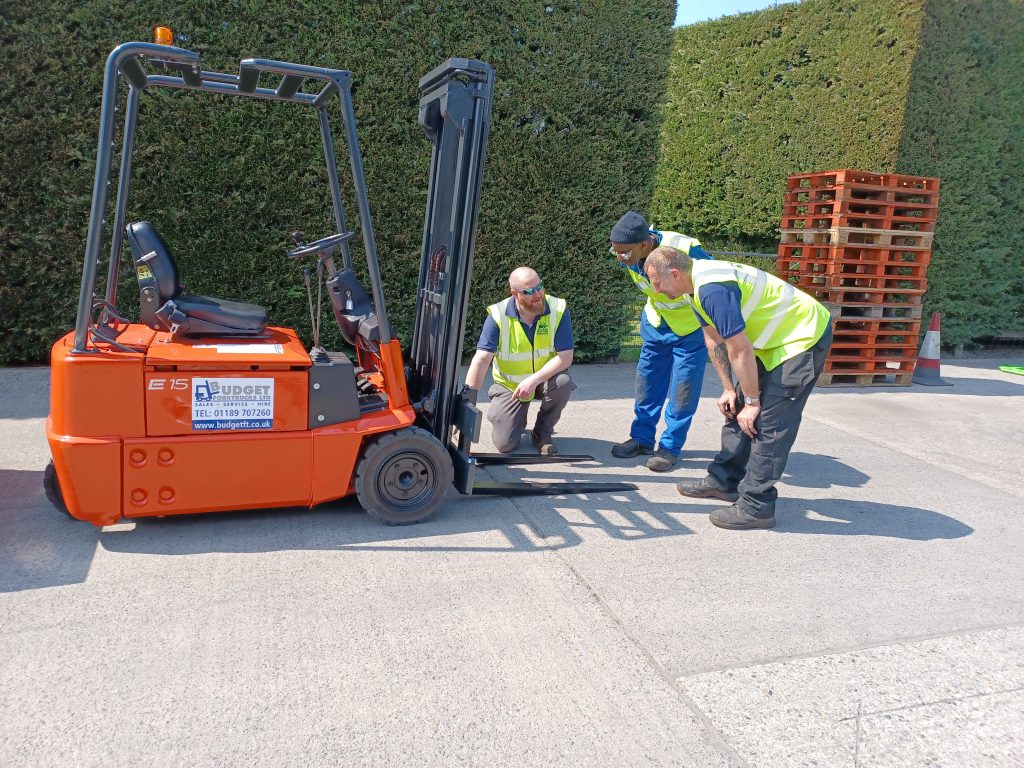Forklifts play a critical role in various industries, enabling efficient material handling and logistics operations. However, operating a forklift requires proper training and certification to ensure the safety of the operator, the surrounding personnel, and the smooth functioning of business operations. We’ve put together this comprehensive guide to forklift operator training so you know what you need to cover to ensure your drivers are fully qualified.
Through our training company, 1st Advanced Training, we offer a full range of forklift training, both at our own site, or at yours. We can work with new forklift drivers, as well as run workplace specific training at your site, and refresher training for your whole team. For the rest of 2023 we are offering 10% off any courses booked, so get in touch today to find out how we can help with your forklift training needs.
Do I need a licence to drive a forklift in the UK?
Yes, in the UK, you need a license to operate a forklift legally. The license is commonly known as a “forklift truck operator license” or “forklift certificate.” The license ensures that the operator has received proper training and has demonstrated competence in operating a forklift safely.
To obtain a forklift license in the UK, you must complete a training course provided by an accredited training provider. The course typically includes both theoretical and practical elements, covering topics such as health and safety regulations, equipment operation, load handling, and hazard awareness.
After successfully completing the training course, you will be issued a certificate of training, which serves as evidence of your competence. It is important to note that different types of forklifts (e.g., counterbalance, reach truck, or rough terrain) may require specific training and certification.
To comply with legal requirements, ensure workplace safety, and operate a forklift legally in the UK, it is crucial to obtain the appropriate license and maintain it by undergoing periodic refresher training as necessary.
What does forklift training need to cover?
As outlined by the Health and Safety Executive, forklift operator training should always include three stages:
- Basic training: the basic skills and knowledge required to operate a lift truck safely and efficiently.
- Specific job training: knowledge and understanding of the operating principles and controls of the lift truck to be used and how it will be used in their workplace.
- Familiarisation training: applying what has been learnt, under normal working conditions, on the job.
Basic and specific job training, which can be combined, should take place off the job (ie away from production and other pressures). Familiarisation training needs to be done on the job, under close supervision.
Specific Forklift Type Training for Forklift Operators
Different types of forklifts require specialized training due to variations in their operation and features. It is crucial for businesses to provide specific forklift type training based on the equipment used within their operations. Some common types of forklifts include:
Counterbalance Forklifts: Training on counterbalance forklifts, which have weight distribution mechanisms to counterbalance loads, is essential for many indoor and outdoor material handling tasks.
Reach Trucks: Reach trucks are commonly used for high stacking in warehouses. Operators must receive training specific to reach truck operation, considering the extended reach and narrower design.
Rough Terrain Forklifts: Often used in construction sites or outdoor environments, rough terrain forklifts require specialized training to handle uneven surfaces, inclines, and other challenging conditions.
What ongoing forklift training is needed for my drivers?
Regular refresher training and recertification are vital to ensure forklift operators maintain their skills and stay updated with the latest safety protocols. Businesses should establish a schedule for periodic training sessions to reinforce best practices and address any gaps in knowledge. Refresher training can help prevent complacency, reinforce safety awareness, and enhance operational efficiency.
What other types of training is useful for forklift drivers?
To further enhance the skills and knowledge of forklift operators, businesses can consider additional training opportunities, such as:
Ergonomics and Injury Prevention: Educating operators about proper body mechanics, lifting techniques, and ergonomics can reduce the risk of injuries and improve overall well-being.
Warehouse Safety: Providing training on general warehouse safety practices can help operators identify potential hazards, promote a safety culture, and contribute to accident prevention.
Investing in comprehensive forklift training is a wise decision for businesses aiming to prioritize safety, boost operational efficiency, and reduce accidents and injuries. By providing basic operator training, specific forklift type training, regular refresher courses, and additional training opportunities, companies can empower their employees to operate forklifts with confidence and proficiency. Remember, a well-trained forklift operator is an asset to any organisation, contributing to a safe and productive work environment.
Here at Budget we work with 1st Advanced Training to provide comprehensive forklift training. Contact us today to find out more.

